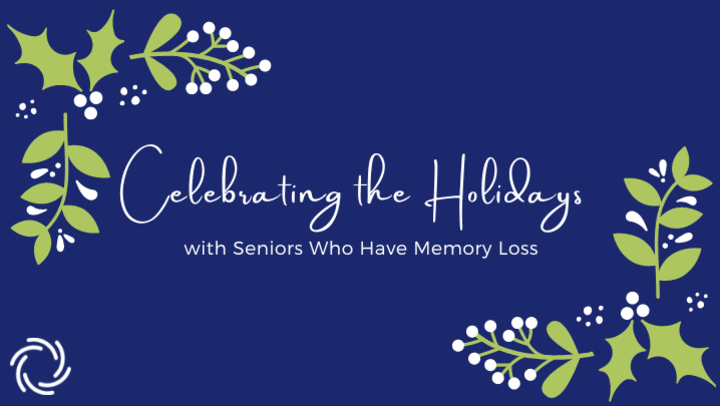The holidays are upon us, which means spending more time with family, participating in celebrations of the season, and a myriad of other fun activities. When your loved one has memory loss, you may find yourself wondering what you can do to make this time of year easier for all involved.
It’s important to consider how best to make the season special for your senior loved one, despite the challenges of their memory loss. It’s often the case that simpler activities are much better for them now. Not having too many expectations of how things will go can help.
5 Insider Tips for Celebrating the Holidays With Your Loved One Who Has Dementia
Joy. Love. Togetherness—all hallmarks of the holiday season. However, for seniors who have memory loss, the holidays can be a challenging time. Celebrating the holidays with a loved one who has dementia requires a little extra planning and consideration. Diana Engle, MBK Senior Living’s Vice President of Health and Wellness, shared some helpful tips to help make your loved one’s season bright.
-
Avoid New Experiences. Old traditions and long-term memory are much more readily accessible for people with memory loss, so it is often more successful to avoid new or unfamiliar experiences. Fortunately, the holidays are ripe with tradition—it’s a great time to tell old stories, watch home movies, and celebrate traditions passed down across generations.
-
Noise and commotion may cause stress. Music is enjoyable—but for background music, use only quiet instrumentals. If you want to listen to upbeat music with singing, have that be all that is happening because sometimes it is too hard for people to handle that and other stimulation. Use caution with TV and movies, as these may have unforeseen upsetting noise or commotion. If kids are running around and playing, monitor your loved one for signs of becoming agitated or overwhelmed.
-
Help others try to simplify communication. Encourage the of use step-by-step instructions, try not to end sentences with a question, not all talk at once, and not ask questions that rely on memory. When offering choices, show the options visually as well instead of relying on auditory comprehension alone.
-
Prepare kids as best you can within their ability to comprehend. Kids are pretty great at being accepting. But if your loved one struggles with paranoia or suspicion, it’s good to make others aware that they might accuse someone of stealing or lying. Kids can find this upsetting, so it is good to prepare them by explaining why this is happening to your loved one’s memory and that it’s okay to go along with it, even if it isn’t true. Kids need extra help understanding these concepts.
-
Include your loved one in a way where they can contribute purposefully. Giving them a useful role with an achievable task will be both pleasantly distracting and mood-elevating. Wrapping gifts, creating floral arrangements, sweeping the porch, reading to children, sorting silverware, folding napkins, stirring ingredients…the more useful and pleasant the activity, the better.
“It is ok to decide not to include a loved one when it feels like it will be too stressful,” Diana emphasized. “Many people opt to have a quiet small visit at the person’s home and let go of bringing them to family celebrations because it has become too difficult. Try to give yourself grace doing what works for both you and your loved one.”
If you are caring for a senior with memory loss, seek support from family, friends, or a support group to help you cope with the demands of caregiving.
Celebrating the holidays with your loved one who has Alzheimer’s disease or another form of dementia can be a joyful experience. By keeping celebrations simple, sticking to familiar routines, being patient and understanding, and taking care of yourself you can help make the holidays more enjoyable for your entire family.





